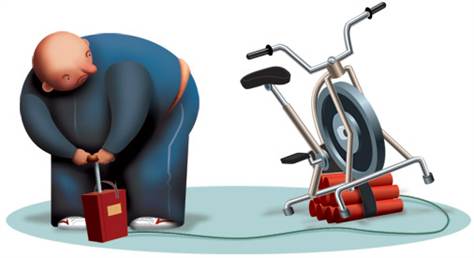When seeking weight loss, most assume that copious amounts of work on the treadmill, dieting, and maybe resistance training are needed. However, it makes a lot of sense to question which is most effective: Diet or Exercise? If we don’t have time, are injured, or simply don’t want to exercise, can we lose weight?

I have plenty of empirical data to tell you what works from seeing hundreds of people achieve results with our approach at Spectrum. But empirical data is not enough to achieve the highest levels of understanding. That’s where some good ‘ole research comes in.
First, let’s answer the question of whether exercise is needed at all to lose weight. The answer is simple: No! You can lose substantial weight without exercise. Here comes the big but…actually two big buts:
1. Weight loss is irrelevant to most people – everyone I speak to wants fat loss and to preserve lean muscle.
2. Losing fat is only part of the goal, and it’s relatively easy. Keeping it off is the real trick.
So is exercise needed for optimal fat loss? Let’s check out the research:
Hunter Et al. Resistance Training Conserves Fat-free Mass and Resting Energy Expenditure Following Weight Loss. Obesity 2008
These researchers looked at 3 groups. Diet only, diet plus aerobics, and diet plus resistance training.
All subjects lost about 25 pounds. But there were some big differences:
1. The group that did resistance training gained a small amount of muscle
2. The diet and diet + aerobics group lost muscle
3. The resistance training group elevated their resting metabolism
4. The diet and aerobics group lowered their resting metabolism
5. The resistance training group maintained their strength levels, but the diet and diet + aerobics groups did not
In short, the resistance training group lost more fat, gained some muscle, preserved strength, and elevated their metabolism compared to the other groups. Guess who would continue to lose or at least maintain for the long term?
That is why resistance training is so important. But not all resistance training is created equal, and it takes time to learn to do it right.
Here’s another study to clarify the issue of losing fat, and keeping it off:
The role of physical activity in producing and maintaining weight loss. Catenacci* and Wyatt. Nature Clinical Practice Endocrinology & Metabolism (2007)
The authors reviewed dozens of studies, and concluded that although possible to lose significant amount of weight with exercise, it was more common and easier (based on adherence rates) to lose a substantial weight with diet. In regards to maintaining weight loss, it seems like exercise plays a more critical role.
I should note that in my experience, we have seen examples of people losing a substantial amount of fat by diet alone. In two recent cases at Spectrum we used dieting alone because of recent injuries or surgeries that made exercise contraindicated, and both not only lost fat but also maintained muscle. This was likely do to the fact that they were on a specific diet geared towards preserving muscle mass and they had a significant amount of fat to lose. In contrast, we had another client who only needed to lose 15 pounds of fat, and elected not to exercise. Although he lost the fat, he also lost some lean mass. (Now he is convinced he needs to exercise!) So the approach of diet only is less effective the leaner you are.
Let’s summarize what we know about exercise and weight loss:
1. Exercise is not needed for weight or fat loss
2. Exercise is needed to maintain weight loss results long term
3. Resistance training will preserve lean mass, strength, and possibly increase metabolism during weight loss
4. Diet plus resistance training is more effective that dieting alone for fat loss
5. Resistance training is more effective and efficient than aerobic training for fat loss and maintaining muscle.
One last point of clarification. Some may selectively read this and decide not to exercise to lose fat. Aside from the obvious health implications and points mentioned above, taking the diet only route is a big mistake. Instead of dieting first, then using exercise to maintain the results, it makes far more sense to begin exercising right away. Why? Because it takes a while to learn how to properly exercise and for tissues to adapt to the stress of exercise. Starting out this way is safer and more effective. Then, when you hit the goal weight, or need more than just diet to continue progress, you are ready to safely deploy the intensity of exercise needed to actually burn calories. A deconditioned or overweight body that suddenly launches into exercise without proper instruction and progression is a disaster waiting to happen.
So here’s your fat loss forever formula:
1. Assess your current status (before pics, measurements, caloric needs based on lean mass, etc)
2. Learn a proper program: diet and exercise, including corrective exercise
3. Take aggressive action on your diet program, modify as needed
4. Learn the how’s and what’s of exercise (what type, how much, technique, progression, etc.)
5. Intensify the exercise program
6. Re-asses, celebrate (if you do things right!), modify
7. Repeat until you can settle into a maintenance plan.
Hope this helps. Check out our Body Balance Challenge which is a nutrition workshop that we hold twice a year, or come meet with us for a free consult so that we can better help you with the whole process.
